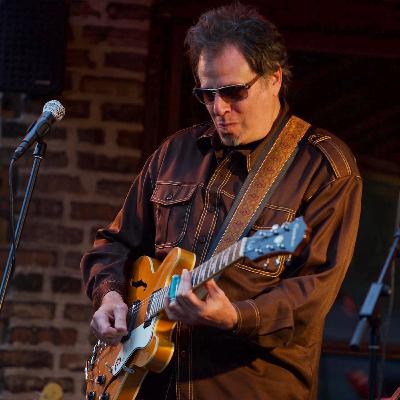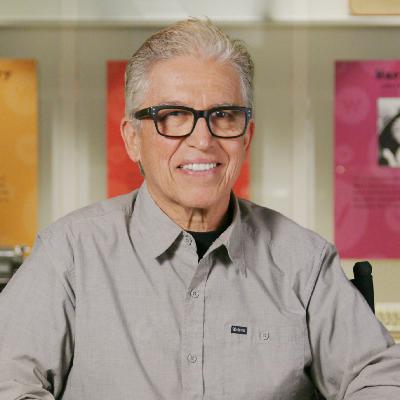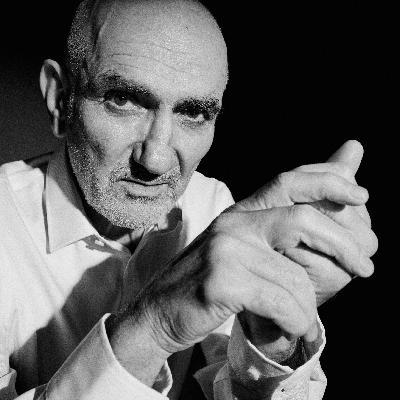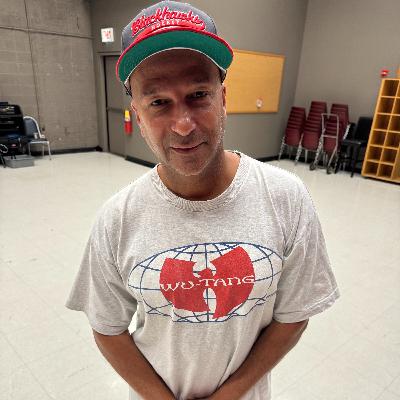Discover Caropop
Caropop

Caropop
Author: Mark Caro
Subscribed: 43Played: 2,829Subscribe
Share
© Mark Caro 2021
Description
There may be nothing more inspiring and entertaining than relaxed, candid conversations among creative people. Mark Caro, a relentlessly curious journalist and on-stage interviewer, loves digging into the creative process with artists and drawing out surprising stories that illuminate the work that has become part of our lives. The Caropopcast is for anyone who wants to dig deeper into the music, movies, food and culture that they love.
222 Episodes
Reverse
Musicians are said to have a lifetime to create their first album and six months to make the follow-up. That was literally the case with Graham Parker, whose landmark debut album, Howlin’ Wind, came out in April 1976, followed that October by the acclaimed Heat Treatment. Parker, the subject of Jay Nachman’s excellent new book Graham Parker’s Howlin’ Wind, tells his fascinating origin story here. He worked in factories and at a gas station, tried on almost every ‘60s/’70s musical style and wrote, wrote and wrote. How many songs had he written before he came up with one that made the cut for Howlin’ Wind? How did he get connected to his ace backing band, the Rumour, and did he start writing with them in mind? The still-active, feisty Parker presents a vivid portrait of the artist as a young man--and conveys his current feelings about how the system is rigged against musicians trying to make a living. (Photo by Steve Goulding)
Michael Blair had much training in percussion, including a degree from the University of Illinois Urbana-Champaign, by the time he pulled out the marimba, congas, drums and other instruments for Tom Waits’ landmark 1985 album Rain Dogs. As was the case with recent Caropop guest Mark Ribot, Rain Dogs propelled Blair to more work with Waits (including the album and Steppenwolf Theatre performances of Franks Wild Years) and projects with Elvis Costello and producers T Bone Burnett and Hal Willner. That’s Blair delivering the “Don’t Let Me Be Misunderstood” riff on marimba on Costello’s cover of the song and playing a wild array of percussion instruments on Costello’s Spike. Blair tells how he landed the drumming gig on Lou Reed’s Magic and Loss and the unusual way that album's drums were recorded. He also relates how he wound up on the Replacements’ All Shook Down and why he has lived in Stockholm, Sweden, for many years. (Photo by Cato Lein.)
I saw bassist Victor Krummenacher, one of my favorite music people, perform twice within three weeks last fall: with Camper Van Beethoven to end perhaps their last-ever tour in Washington, D.C.; and with the Third Mind, the improvisatory band also featuring Dave Alvin, in Milwaukee. Both shows were fantastic. Now Krummenacher has a new album, the cinematic Block Out the Sun, and is reflecting on the inevitable artistic collision between one’s personal life and what’s happening in the outside world. He also discusses an upcoming album collaboration between most of the Third Mind and former Fairport Convention singer (and Caropop guest) Iain Matthews; the recently announced Record Store Day release of Camper Van Beethoven’s version of Fleetwood Mac’s Tusk; Krummenacher’s vision of a possible Camper future; and that David Lowery song that quotes something hostile that Krummenacher allegedly said to the Camper frontman when the band was first breaking up. (Photo by Jesse Sykes.)
I first saw and interviewed Dag Juhlin more than 30 years ago when he was singing, writing and playing guitar with the power-pop trio the Slugs. He’s had many musical lives since then, including playing in Poi Dog Pondering’s expansive Chicago lineup, performing deep-cut covers in Expo’76 and Courtesy Patrol, supporting Len Kasper’s songwriting in Sonic45 and singing and writing songs with his latest trio, Sunshine Boys. He’s also about to hit the road with Michael Shannon & Jason Narducy and Friends to mark the 40th anniversary of R.E.M.’s Lifes Rich Pageant. He talks about all that here, including the striking popularity of the R.E.M. project, whether it’s a tribute band or something else, and how that amazing photo of Juhlin with Michael Stipe came to be. He also tells the Sunshine Boys origin story and explains how that band “unquit the music business.” (Photo by David Kindler.)
I first noticed Marc Ribot’s slinky, spiky guitar playing as “Jockey Full of Bourbon,” from Tom Waits’ Rain Dogs, slithered over the opening of Jim Jarmusch’s Down By Law. Rain Dogs was a breakthrough for Ribot, who previously had played in Brother Jack McDuff’s soul-jazz band, backed Wilson Pickett and Solomon Burke, and been a member of the Lounge Lizards. More Waits collaborations followed, as did work with Elvis Costello, Sam Phillips, McCoy Tyner, Yoko Ono, Robert Plant and Allison Krauss, Elton John and Leon Russell, and many others. Here Ribot reflects on his robust studio-musician and solo career; his love of Latin American music; the creative leeway that Waits, Costello and others gave him; the impact of producers such as T Bone Burnett and Hal Willner; his decision to sing lead for the first time on his long-gestating 2025 album, Map of a Blue City; and his fight for indie musicians’ rights with the Music Workers Alliance. (Photo by Eric van den Brulle.)
In our annual check-in with renowned mastering engineer Kevin Gray, he reflects on a very busy 2025 that included his Rhino High Fidelity versions of Fleetwood Mac and Lindsey Buckingham and Stevie Nicks’ long-out-of-print Buckingham Nicks. How did Gray and fellow mastering engineer Chris Bellman feel about Rhino releasing separate versions of Buckingham Nicks mastered by each of them? Gray also discusses the Rhino High Fidelity John Coltrane: 1960-1964 Mono box, for which he revisited some albums he’d previously mastered in stereo. Gray's RHF version of T. Rex’s Electric Warrior followed the label’s reel-to-reel tape release of that album—which should sound better? Of course, we had to address the hullabaloo sparked by Gray’s comments on Caropop a year ago criticizing the One Step pressing process. Was he surprised? Does he feel vindicated? Other topics covered: Gray’s Blue Note Tone Poet work with producer Joe Harley; the jazz albums Gray is recording and releasing on his Cohearent Records label. What’s in store for 2026?
Mitch Easter and Don Dixon, accomplished producers and performers on their own, came together to produce one of rock’s greatest debut albums, R.E.M.’s Murmur. That 1983 classic plus the preceding, Easter-produced EP, Chronic Town, have gotten the all-analog, One Step treatment in a numbered, limited-edition vinyl release from Interscope-Capitol’s Definitive Sound Series. We reunited Easter and Dixon to discuss the making of Murmur plus the follow-up they produced, Reckoning. What did they each bring to the process? Why does one of them consider Murmur to be the Dark Side of the Moon of the New Wave era? What had changed by the time they recorded Reckoning? Easter also talks about working again with R.E.M. guitarist Peter Buck and bassist Mike Mills on the latest Baseball Project album, and Easter and Dixon offer details about Murmur that even this longtime R.E.M. fanatic found revelatory. (You’ll never hear “Radio Free Europe” or “Perfect Circle” in the same way.)
Robyn Hitchcock turned 14 in 1967, the year that blew his musical mind open. This English boarding school student and future singer-songwriter-musician already looked to Bob Dylan for the meaning of life when along came the psychedelic train powered by the Beatles, the Syd Barrett-led Pink Floyd, the Jimi Hendrix Experience, the Kinks, the Incredible String Band and much more. Hitchcock reflects on his awakening with a vivid memoir, 1967: How I Got There and Why I Never Left, and a mostly acoustic, mostly covers album, 1967: Vacations in the Past. Here we bat around perhaps the most creatively explosive year in the rock era, and he applies his whirligig mind to such questions as whether the music of 1967 would have had such an outsized impact on his own music if not for where, how and at what age he experienced it. He also discusses the newly remixed, remastered version of his 1988 album Globe of Frogs.
Here's a quick holiday message that you can squeeze in amid all of your seasonal running around. And please check out our Caropop YouTube Channel in the meantime and hit "Subscribe." Thanks for listening, and happy everything!
Many of us first heard Wesley Stace on the 1990 album Here Comes the Groom that he recorded as John Wesley Harding, the name taken from Bob Dylan’s stripped-down late-1967 album that itself misspelled a Texas outlaw’s name. The English singer-songwriter has enjoyed a robust folk-rock career as Harding but also has written four acclaimed novels under his own name and began recording albums without the pseudonym in 2013. Still, he recently performed as John Wesley Harding at a Wild Honey Foundation tribute concert to Warren Zevon and on his own tour. Here he discusses where Harding ends and Stace begins (or vice versa), how he evolved as an artist, why he mined Frank Capra projects for early album titles, what Zevon once told him, how he reacted to not-so-nice comments from Elvis Costello and why he decided to become a U.S. citizen in 2025. Stace, no surprise, is as thoughtful and witty in conversation as in song. (Photo by Ebet Roberts)
Dave Specter didn’t pick up a guitar till his late teens, yet in his 20s he was Son Seals’ rhythm guitarist for two years, and soon he was a bandleader himself. Specter grew up amid Chicago’s blues scene and became one of its great players and ambassadors. Here he recalls the glory days of Chicago’s blues clubs and the varying vibes. He recounts the evolution of his sound and his progression of guitars. He explains how he creates a solo and why, after years of playing mostly instrumentals with the occasional guest vocalist, he began singing. He tells how his recently released “The Times They Are Deranging (The Buck Stops Where?)” fits in with the songs of conscience he always has admired. And he offers the origin story of Space, the excellent, musician-friendly Evanston, Ill. club where he’s a partner. (Photo by Mike Hoffman)
Running a boutique audiophile label is not easy, as Shane Buettner has learned in the 10 years since he founded Intervention Records. There are licensing agreements to be negotiated, artists to please, mastering engineers and pressing plants to be engaged, vinyl formulation and cover design to be arranged, plus marketplace changes and ever-increasing competition to be navigated. The label’s first release was Stealer’s Wheel’s debut, with standout pressings featuring Joe Jackson, Judee Sill, Matthew Sweet, the Flying Burrito Brothers, Peter Frampton, Everclear and others to follow. With so many labels jumping into the audiophile pool, has licensing recordings become harder? What dictates pricing? Do Buettner’s customers care more about 180-gram vinyl or tip-on jackets? And how did he land Intervention’s new Sun Records deal, with Kevin Gray-mastered 45 RPM releases from Carl Perkins and Johnny Cash on the way?
It's our Thanksgiving message for 2025!
Louie Pérez has written many great songs for Los Lobos, but “Saint Behind the Glass” is especially close to his heart. It was inspired by a saint statue from his family’s home and now is part of the exhibit American Prophets: Writers, Religion and Culture at the American Writers Museum in Chicago. Perez offers that song’s origin story, digs into his songwriting dynamic with singer-guitarist David Hidalgo, discusses their trippy side project the Latin Playboys, reflects on the impact of Los Lobos’ smash cover of Richie Valens’ “La Bamba” and says whether, 10 years after their last album of original material, Los Lobos is preparing new music. He also reveals a recent health issue and whether it affected his return to the stage, he addresses how artists can respond to the current administration’s toxicity toward immigrants, and he offers inspiring words for anyone involved in the act of creation.
Bob Merlis ran the Warner Bros. publicity department for much of his 29 years at the label, and he has tales to tell. He recalls his adventures as a Columbia University student presenting concerts by the Byrds and others, as well as his rock journalist stint, his encounter with “supernova” Little Richard and a classic misunderstanding with the Carpenters. Soon he was working with Dion DiMucci, ZZ Top, Debbie Gibson, Talking Heads, Devo, the B-52’s, the BoDeans, Madonna, R.E.M. and many others. Which act was the beneficiary of “the cheapest promo in the history of Warner Bros”? Who reacted hostilely to his publicity ideas? Who was especially cool? How did the label vibe change? After Merlis left Warner Brothers, what was Chris Isaak’s valuable advice? And what role did late Rolling Stones/Beatles manager Allen Klein play in Merlis’s next act?
Paul Kelly has been one of Australia’s—and the world’s—premier singer-songwriters for decades, having been introduced to American audiences with the mid-‘80s albums Gossip and Under the Sun and songs such as “Before Too Long,” “Darling It Hurts,” “Dumb Things” and “To Her Door.” His new album, Seventy, finds his voice and songwriting powers undiminished as he continues delivering deep reflections, vivid storytelling and ear worms, including “Rita Wrote a Letter,” a sequel to his 1996 song “How To Make Gravy.” Here he reflects on his life as a musician in Australia, his travels to the U.S., his evolution as a songwriter, his enjoyment of setting poetry to music, his years of being “a recreational heroin user” and what he has learned. Is songwriting his way to make sense out of being human? (Photo by Dean Podmore)
Paul Myers is one of those do-it-all guys: author of the new John Candy: A Life in Comedy, host of the Record Store Day Podcast (which he also writes, produces, engineers and composes the music for), radio and TV host, musician, and author of books about Kids in the Hall, Long John Baldry, Barenaked Ladies and the one that hooked me on his work, A Wizard, a True Star: Todd Rundgren in the Studio. We dig into Candy’s life, an inspirational story and cautionary tale that makes you laugh and breaks your heart. We also flash back on Paul Myers’ years growing up in Toronto with his Beatles/Monty Python-loving parents from Liverpool and his brothers, including writer/performer Mike Myers. How did he wind up becoming a musician, writer and radio/TV/podcast host? What have been his biggest podcasting thrills? And what are his picks for the upcoming Record Store Day Black Friday? (Photo by Liza Algar)
After Camper Van Beethoven performed the final show of its recent tour in Washington, D.C.—and perhaps its last show ever—violinist/multi-instrumentalist Jonathan Segel returned to Stockholm, Sweden, where he has lived for the past 13 years. Segel is well traveled as a musician and otherwise, having been born in Marseille, France, grown up in Davis, Calif., and played with Sparklehorse as well as the Øresund Space Collective and on solo projects. He was a key element, if not the sparkplug, in the classic Camper Van Beethoven lineup until, he says, frontman David Lowery dismissed him before the band recorded Key Lime Pie and then broke up altogether. Segel recalls how he found his place in a band that would shift from ska to klezmer music to crunching rock within a few measures. He describes the band's rise, his departure, how he and Lowery patched things up and whether the far-flung bandmates might record or perform together again. (Photo by Bengt Alm)
This conversation with Rage Against the Machine/Audioslave guitarist-songwriter Tom Morello took place immediately after the final preview of the new punk-metal-hip-hop musical, Revolution(s) at Chicago’s Goodman Theatre. Little did Morello, whose music propels the show, and playwright Zayd Ayers Dohrn know when they began work on Revolution(s) that it would be opening in a freshly militarized Chicago. With characteristic passion and insight, Morello reflects on his history of writing politically charged music and weighs the impact it still might have. He also digs into how he got such mind-bending sounds from a guitar and became an artist in the process; what he learned from touring and recording with Bruce Springsteen; how he spearheaded Black Sabbath’s final all-star “Back to the Beginning” show just 17 days before Ozzy Osborne died; and what happened when Morello told off Cubs ownership from a benefit concert stage in 2014.
Peter Guralnick, an author I've long admired, wrote the definitive Elvis Presley biographies Last Train to Memphis and Careless Love and has returned with The Colonel and the King. Drawing on fresh research and volumes of previously unseen letters, the author casts new light on Colonel Tom Parker, an identity-changing Dutch immigrant who became Presley’s manager for life. Guranick’s complex portrait of Colonel (not “the Colonel”) will surprise anyone who thinks of him as an all-controlling ripoff artist. Here, Guralnick discusses his own relationship with Parker and bats around questions such as how Colonel’s constant deal-making affected Elvis’s artistry. Was Colonel exploiting his client or doing what he had to do to keep the free-spending singer afloat? What roles did each of their addictions play in their professional relationship? Guralnick’s expertise and enthusiasm on these topics is unrivaled. (Photo by Mike Leahy)
























